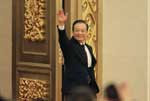DENVER – For many foreign audiences, the United States’ primary elections for the 2012 presidential vote – which will, alas, continue to rage into the summer – must be a frightening display of what Americans and their leaders do not know about foreign policy. Debate after debate reveals the fact that none of the candidates seeking to challenge President Barack Obama is particularly interested in the details of any of America’s relationships around the globe, not to mention the crises that dot the international landscape, especially those that do not involve US troops.
Indeed, ignorance seems to be a source of strength for the candidates still in the race. When Jon Huntsman, an early contender, displayed some real intellectual heft by making a few useful points about dealing with China, punctuated by a brief display of his own mastery of Mandarin, some other candidates responded with derision. To have even known the Chinese perspective seems to have been disqualifying for Huntsman, who soon ended his candidacy. Foreign policy, it seems, increasingly excites only the emotional parts of a presidential candidate’s brain.?
The fact is that Americans often have a difficult time understanding why the details of foreign policy should matter to them. Unfortunately, the Republican candidates have done little to help them. In 2008, then-presidential candidate John McCain occasionally tried to do so, explaining at one point to a skeptical audience his views on the growing problems in Baluchistan. But, for the most part, the candidates have steered clear of speaking Chinese or discussing troubled Pakistani provinces.
The world might expect that the American people – the stewards of the world’s only superpower, – would be far more engaged on foreign-policy questions. Instead, they see Americans as increasingly reducing US involvement in the world to a morality play – Gary Cooper’s iconic role as the lone sheriff among the craven townspeople in High Noon comes to mind. (Those who see a role for “coalitions of the willing” might be broad-minded enough to consider Rio Bravo, in which John Wayne welcomes some allies.)
Foreign visitors to the US often comment that Americans are probably among the most patriotic people in the world, and are becoming much more so. People used to display American flags on their homes only on national holidays. Otherwise, they were found only outside government buildings. Today, they are displayed everywhere all year (with the largest, it seems, outside car dealerships, regardless of whether imported cars are being sold). Likewise, for decades, baseball games have begun with the national anthem; but now, two thirds of the way through the game, fans are asked to stand again and sing “God Bless America.”
To be sure, part of the current dynamic has to do with the aftermath of the September 11, 2001, terrorist attacks. But this wave of patriotic fervor seems sustained by even stronger forces – perhaps by a frustrated emotional sense that America’s motives are not properly understood in the rest of the world. A popular and enduring country song sums it up with the refrain: “I’m proud to be an American, where at least I know I’m free.”
At least? America has had a knowledge-based economy and one of the highest living standards in the world for decades. Freedom is surely the foundation of that success, but, not to go out on a limb, that achievement is also a reason to be proud. Even today, America’s economy remains one of its most admired features in the rest of the world – including in China.
Yet Americans seem discouraged. I remember the saddened look on the face of a US election observer in Iraq, a state legislator from Texas, when, after asking an Iraqi official whether Iraq planned to repay the US for “introducing democracy” to his country, the official (at first not quite understanding the question) shook his head ruefully. She walked away.
This year’s presidential debates have addressed foreign policy solely in terms of whether the candidate would be “tough” enough to deal with the challenges – that is, as a question of emotional fortitude, rather than of the intellectual foundation required to understand those challenges.
American political history is replete with presidents who in one way or another did not appear to measure up on the world stage. President John F. Kennedy’s first meeting with Soviet Premier Nikita Khrushchev stands out in American political lore: the young American President somehow comes across as underwhelming to his Soviet counterpart, who then tries to get away with deploying long-range nuclear missiles in Cuba, a move that brought the US and USSR as close to war as they ever came. Given such narratives, foreign policy devolves in US political campaigns into a kind of testosterone check, rather than what is needed: a test of knowledge and judgment.
The good news is that there is plenty of historical evidence to suggest that, once in office, the candidate develops an understanding of the issues and a feel for the nuances in managing them – a fact that should be calming to the international public. But, whether caused by an excess of cable television, or an excess of debates themselves, this “silly season” has seemed especially prolonged, even frightening. Whether the presidential candidates know it, or are in the least bit interested, the world listens to their words with greater care than they have sometimes shown in uttering them.




